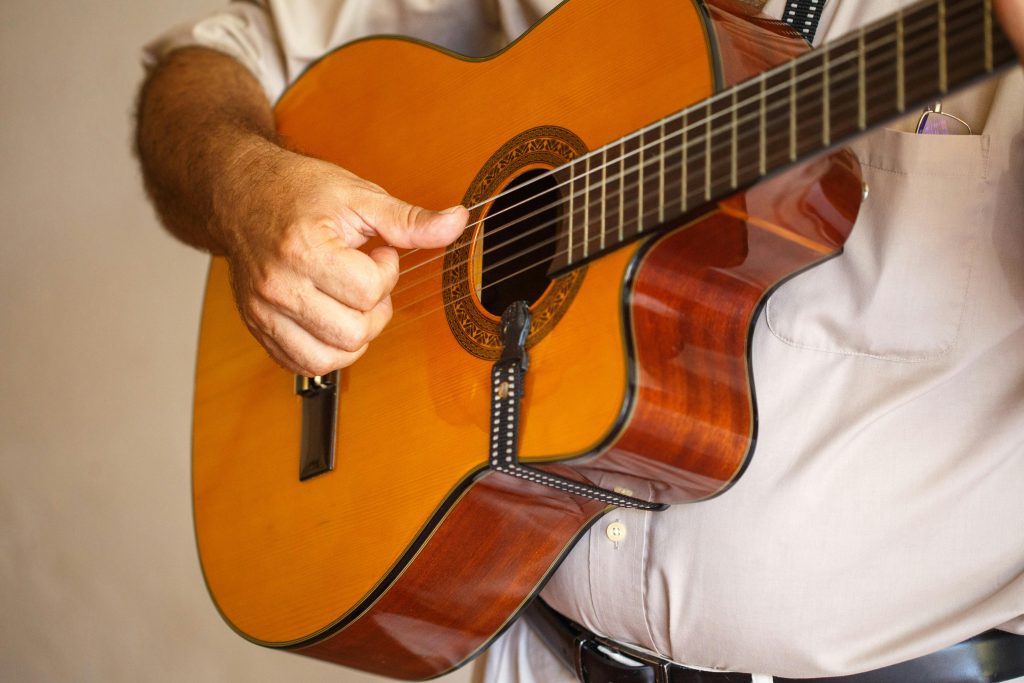Starting your musical journey as a guitarist feels like a huge step. While you may think of starting to play music with an acoustic or electric guitar, learning the classical guitar first gives you the foundation you need.
With its structured lessons and nylon strings, the classical guitar provides beautiful tones and a clear learning experience that develops skills you could use for a lifetime. The seven reasons below support why you should learn the classical guitar as an aspiring musician.
1. Build a Strong Foundation in Music Theory
Whether you’re taking online classical guitar lessons or in-person sessions, classical guitar training introduces beginners like you to music theory. You’ll learn to read notes, understand chords and melody, and analyze a new piece like classical composers did.
Knowledge of musical theory can transfer to other music genres, such as jazz, folk, and rock. You can play various kinds of songs faster when you know the basics.
2. Improve Finger Independence
Practicing classical technique helps build finger independence. You’ll master playing guitar using the right-hand technique and left-hand accuracy for an expressive sound, fluid chords, and clean tones.
Finger independence can make it easier for you to play classical music and solidify your skills for other genres.
3. Soothing Tones Inspire Consistent Practice

Strumming the guitar’s nylon strings produces gentle sounds that soothe your ears and motivate you for regular practice. Students may stick with the classical guitar longer than other instruments because of the pleasant sound, unlike the sharper tones of a steel-string acoustic guitar.
The learning process becomes easier when the music feels enjoyable for learners.
4. Learning the Historical Context
Studying classical guitar also lets you explore its rich history. Great composers like Heitor Villa-Lobos, Fernando Sor, and Francisco Tárrega have contributed to classical guitar music and made it what it is today. Understanding the origin of their pieces makes learning more impactful.
Connecting with past musicians gives your musical journey more depth and a sense of belonging.
5. Master Good Technique
Classical guitar training requires precision, teaching you good technique to help you make faster progress. You’ll learn proper posture, hand placement, and right-hand technique. Your teacher can also guide you to avoid bad habits when playing guitar.
6. Flexibility Across Musical Genres
Once you master playing the classical guitar, you can easily branch out into pop, flamenco, and even rock. Many modern guitarists who excel in various genres started with classical training. Your skills in note accuracy, rhythm, and fingerpicking can be used in other music genres.
This also means you can explore playing classical guitar music from a few centuries ago. It deepens your appreciation of classical music and takes your skills to the next level when tackling a new piece.
7. Beginner-Friendly Yet Challenging
Plucking the classical guitar’s nylon strings feels softer and easier on the fingers, making it great for those who have just started learning to play guitar. But at the same time, learning from classical guitarists is also challenging, especially when mastering techniques. It just creates the perfect balance for younger learners and serious musicians.
The Role of Teachers and Video Lessons
Today, video lessons make learning classical guitar online possible, giving busy adults the flexibility they need. Here’s what teachers and video lessons can do for your guitar-learning process.
- Your teacher can give structure to your lessons, feedback on your playing, and the motivation to keep going.
- Teachers may combine traditional lessons with digital resources for a faster learning process.
- Structured guidance helps you learn and master classical guitar confidently.
How to Practice Playing the Classical Guitar Alone

Practicing the classical guitar by yourself needs structure and discipline. Here’s how you can do it:
Create a Focused Environment
- Have your own practice area somewhere in your home. Use a comfortable chair and footstool to keep proper posture.
- Keep your guitar, metronome, sheet music, and tuner within reach.
- Turn off your phone or notifications to focus on your practice.
Warm Up and Strengthen Your Technique
- Practice basic techniques like rest stroke and free stroke to develop proper tone.
- Use scales and arpeggios to train familiarity and coordination with the fretboard.
- Stretch your wrists and fingers gently before and after practice to avoid strain.
Break Music into Manageable Parts
- Work on four to eight measures when practicing songs.
- Play the song at half speed first to make sure you’re accurately playing it before increasing the tempo.
- Repeat tricky passages until the finger movements feel natural.
Stay Engaged and Self-Motivated
- Decide what you want to achieve in every practice, such as improving your tone or playing a passage smoothly.
- Mix tried-and-tested playing techniques with pop songs to avoid getting bored.
- Celebrate your small wins every time you achieve something.
Final Thoughts
Learning classical guitar makes you more equipped with solid technique, deep musical knowledge, and the ability to play other genres. For beginner guitarists, the classical guitar is the ideal tool for playing with precision.
The right approach to studying and practice can make guitar playing joyful and rewarding, whether through video lessons or alone.




















